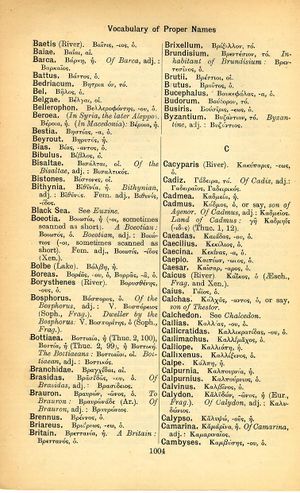Brutus: Difference between revisions
Ἐκ τῶν πόνων τοι τἀγάθ' αὔξεται βροτοῖς → Crescunt labore cuncta bona mortalibus → Das Gute wächst den Sterblichen aus ihrem Müh'n
(D_2) |
(Gf-D_2) |
||
| Line 1: | Line 1: | ||
{{WoodhouseENELnames | {{WoodhouseENELnames | ||
|Text=[[File:woodhouse_1004.jpg|thumb|link= | |Text=[[File:woodhouse_1004.jpg|thumb | ||
|link={{filepath:woodhouse_1004.jpg}}]]Βροῦτος, ὁ. | |||
}} | }} | ||
{{Lewis | {{Lewis | ||
| Line 6: | Line 7: | ||
}} | }} | ||
{{Gaffiot | {{Gaffiot | ||
|gf=(2) <b>Brūtus</b>,⁷ ī, m., surnom romain : L. [[Junius]] [[Brutus]], premier [[consul]] de Rome : Liv. 1, 56, 7 || M. [[Junius]] [[Brutus]], un des chefs de la conjuration contre César : Cic. Phil. 1, 8 || autres du même nom : Cic. Br. 107 ; 175 ; 222 || titre d’un traité de rhétorique de Cicéron. | |gf=(2) <b>Brūtus</b>,⁷ ī, m., surnom romain : L. [[Junius]] [[Brutus]], premier [[consul]] de Rome : Liv. 1, 56, 7 || M. [[Junius]] [[Brutus]], un des chefs de la conjuration contre César : Cic. Phil. 1, 8 || autres du même nom : Cic. Br. 107 ; 175 ; 222 || titre d’un traité de rhétorique de Cicéron.||M. [[Junius]] [[Brutus]], un des chefs de la conjuration contre César : Cic. Phil. 1, 8||autres du même nom : Cic. Br. 107 ; 175 ; 222||titre d’un traité de rhétorique de Cicéron. | ||
}} | }} | ||
Revision as of 07:28, 14 August 2017
English > Greek (Woodhouse)
Βροῦτος, ὁ.
Latin > English (Lewis & Short)
Brūtus: i, m., = Βροῦτος [1. brutus,
I a Roman cognomen.
I L. Junius, the relative of Tarquinius Superbus, saved by his feigned stupidity whence the name, and the deliverer of Rome from regal dominion, Liv. 1, 56, 7 sq.; Ov. F. 2, 717; 2, 837; Verg. A. 6, 818; Cic. Tusc. 1, 37, 89 saep. After him, Brutus was the cognomen of the patrician gens Junia.—
II From the plebeian gens Junia,
A M. Junius, son of Servilia, a half-sister of Cato Uticensis by M. Brutus (not by Cæsar; v. Ellendt Cic. Brut. p. cxxvii.), an intimate friend of Cicero about the 21st year of his age, and one of the murderers of Julius Cœsar, Suet. Caes. 80 sq.; id. Aug. 10; Vell. 2, 56, 3; 2, 58, 1; Tac. A. 1, 2; Cic. Phil. 1, 3, 8; 1, 4, 9 and 10; 2, 12, 28 sq.; 2, 13, 31; id. Fam. 3, 4, 2; as a philos. and orator active and respected, id. Ac. 1, 3, 12; id. Fin. 1, 3, 8; id. Tusc. 5, 1, 1 sq.; id. Att. 12, 5, 3; 13, 9, 2; Plut. Brut. 4; Cic. Or. 71, 237; Quint. 10, 1, 123; Tac. Or. 17 sq.; 21; cf. Ellendt, above cited; Meyer, Fragm. Orat. 205. To him Cic. dedicated his writings: Orator, Brutus, de Deorum Naturā, de Finibus, and Tusc. Quaestiones.—
B D. Junius, a fellow-conspirator with the preceding, Suet. Caes. 80 sq.; id. Aug. 10; Vell. 2, 56 sq.; Cic. Phil. 3, 1, 4; id. Fam. 10, 11, 2; id. ad Brut. 1, 2, 2; to him are addressed the letters, Cic. Fam. 11, 5 sqq.; 12 sqq. al.—To these two Cicero's witticism has reference: quid ergo? Ista culpa Brutorum? Minime illorum quidem, sed aliorum brutorum, qui se cautos ac sapientes putant, Cic. Att. 14, 14, 2; cf. id. Phil. 4, 2, 7; id. Att. 14, 20, 2; Liv. 1, 56, 8; Ov. F. 2, 717.—
2 Derivv.
a Brūtĭā-nus, a, um, adj., of or pertaining to (M. Junius) Brutus: castra, Vell. 2, 72: Cassianaeque partes, id. 2, 74: bellum civile, Lact. 2, 7 fin.—
b Brūtīnus, a, um, adj., of or pertaining to Brutus (M. Junius): consilia rei publicae liberandae, Cic. Ep. ad Brut. 1, 15.—
III D. Junius Brutus Callaicus, consul with P. Corn. Scipio Nasica Serapio A.U.C. 616, Cic. Brut. 28, 107; id. Leg. 3, 9, 20; id. Balb. 17, 40; Vell. 2, 5.—
D. Junius Brutus Julianus, consul with Mamercus Æmilius Lepidus A.U.C. 677, Cic. Brut. 47, 175; id. de Or. 2, 33, 142; id. Att. 12, 22, 2.—
M. Junius Brutus, the husband of Servilia, and father of the murderer of Cœsar, a distinguished lawyer, Cic. Brut. 62, 222.
Latin > French (Gaffiot 2016)
(2) Brūtus,⁷ ī, m., surnom romain : L. Junius Brutus, premier consul de Rome : Liv. 1, 56, 7 || M. Junius Brutus, un des chefs de la conjuration contre César : Cic. Phil. 1, 8 || autres du même nom : Cic. Br. 107 ; 175 ; 222 || titre d’un traité de rhétorique de Cicéron.

